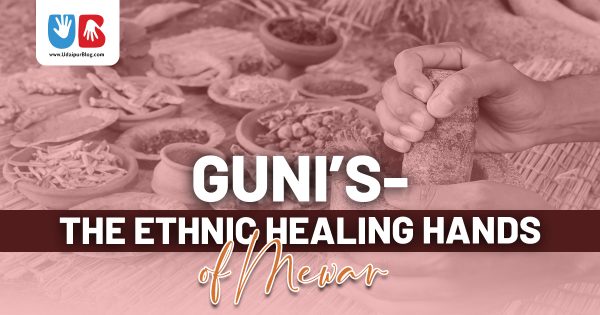Forest dwellers all over the world have had their own classified lifestyles. Be its settlement patterns, food preparation, architecture, community beliefs and even medicine and disease management. The forest dwellers of Mewar too, have had their own methods to treat and manage various diseases with the help of their plethora of knowledge about herbs. The members of the forest communities see this knowledge as the most reliable and something that they inherit from their ancestors. They believe in forests and their products to be the cure for almost all ailments.
With India having dedicated literature of Ayurveda, which accepts and preaches about nature being the solution to all physical inconveniences, it’s no surprise that forest people have had an efficient disease control structure. The traditional medicine system of the forest people runs parallel to Ayurvedic tradition as parts of the plant or tree such as the trunk, leaves, flowers, gum, etc. are used in some or the other way in terms of direct application to oral consumption for the purpose.
The spices prepared by drying the fruits, leaves, trunk skin etc. have been considered most powerful in case of some specific illnesses. The forest people who are engaged in medicinal talent in Rajasthan are called “Guni” meaning, ‘meritorious’. The etymology is based on the Hindi word “Gun” meaning excellence. These communities have acquired the reliance of people for treating them over the course of many years. The discovery of the role of plants in treating human ailments cannot be marked by a specific date in history but oral history tells us that plant-based medicinal practices have been carried out since ancient times.
Gunis and Plant-Based Herbal Healing
The usage of herbs by the forest people must have been accidental and the result of curious exploration. The “mantra uccharan”, bathing in holy water bodies, temple visits and contact of the patient’s body to the statue of god and goddesses, offering sacrifices to deities, feeding young girls and cows etc. was also accompanied by the oral and applicative use of herbs. It has been seen worldwide that traditional knowledge of herbs has been passed on through oral history.
As we were researching, it was seen that very little has been recorded in the literature and efforts are being made constantly in the direction to have more and more written evidence. It has been realized that it is extremely important to conserve this traditional practice as this aspect of the forest dwellers of Mewar needs preservation. The rural and forested areas of Mewar are well known and accessible even by the urban population, through oral communication, despite having access to modern medical facilities. Herbal medicines are yet to gain prevalence again. Known by various names, the classification lies where Vaidyas are the clan of healers belonging to the Brahmin community and follow precise Ayurveda whereas Gunis are a group of forest healers with their own methods.
Where Ayurveda is a more celebrated and developed herbal approach in India, the use of herbs is a continuous hereditary tradition in tribal communities. There is no certification or verification for the herbal healers from forest people and their services are limited to a particular region and community. Gunis have been termed exceptionally learned when it comes to plant-based healing as they are well aware of each and every part of the plant and its use to heal various ailments.
There is also no gender discrimination observed within the healer tribes as female Gunis have earned equal respect as the male ones. Herbs and their by-products are deeply rooted in their lifestyle and culture and only that seems to matter when it comes to curing an ailment. The concoctions, syrups, powder and tablets made from the leaves, flowers, bark, oil, fruit pulp, seeds, etc. extracted from the various plants such as chirmi, gunja, roheda, Sangwan, Haldi, Amarbel, Babool, Kali Musli, Datura, Morpankhi, Giloy, Ashwagandha, Rinjani, Khair, Kulthi, etc. have been used to successfully treat ailments like asthma, arthritis, infertility, gonorrhoea, syphilis, tuberculosis fever, malaria, cough, snake bite, herpes, eczema, kidney stone, external tumour, dysentery, epilepsy, piles, rheumatism etc. Nature for the forest people of Mewar is not just a resource, but an important part of life. They worship nature as a deity and have it positioned as something extremely sacred.
NGOs such as Jagaran Jan Vikas Samiti based in Udaipur, Rajasthan work in the favor of strengthening the institutional presence of Gunis. The data from the latest meet of the Samiti shows that Gunis do not believe in inter-community/ tribal discrimination as a member of various tribes such as Rawat, Kathodis, Gameti, Garasia etc. attended the meet to share their vows and experiences around herbs.
These Mewar forest dwellers made a significant contribution to that tale of bravery. They have continued to serve as the Aravalli’s watchmen and the top-tier Dharmarakshaks. They have guarded Bharat and Mewar against all threats. The Rana Punja Award is given by the Maharana Mewar Foundation to recognise individuals of tribal descent who have made outstanding contributions. In particular, as we commemorate the Amrit Kaal of independence, it is the genuine endeavour of this article series to bring to light the unending contributions of the Mewar forest people in the service of “Eternal Mewar” and the eternal civilization that is Bharat.


